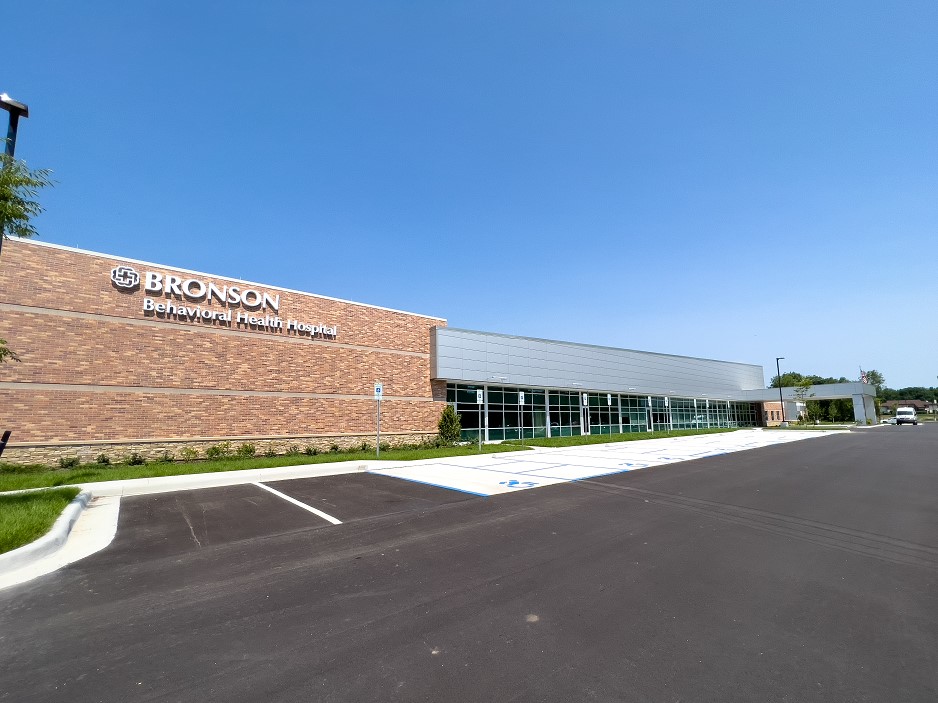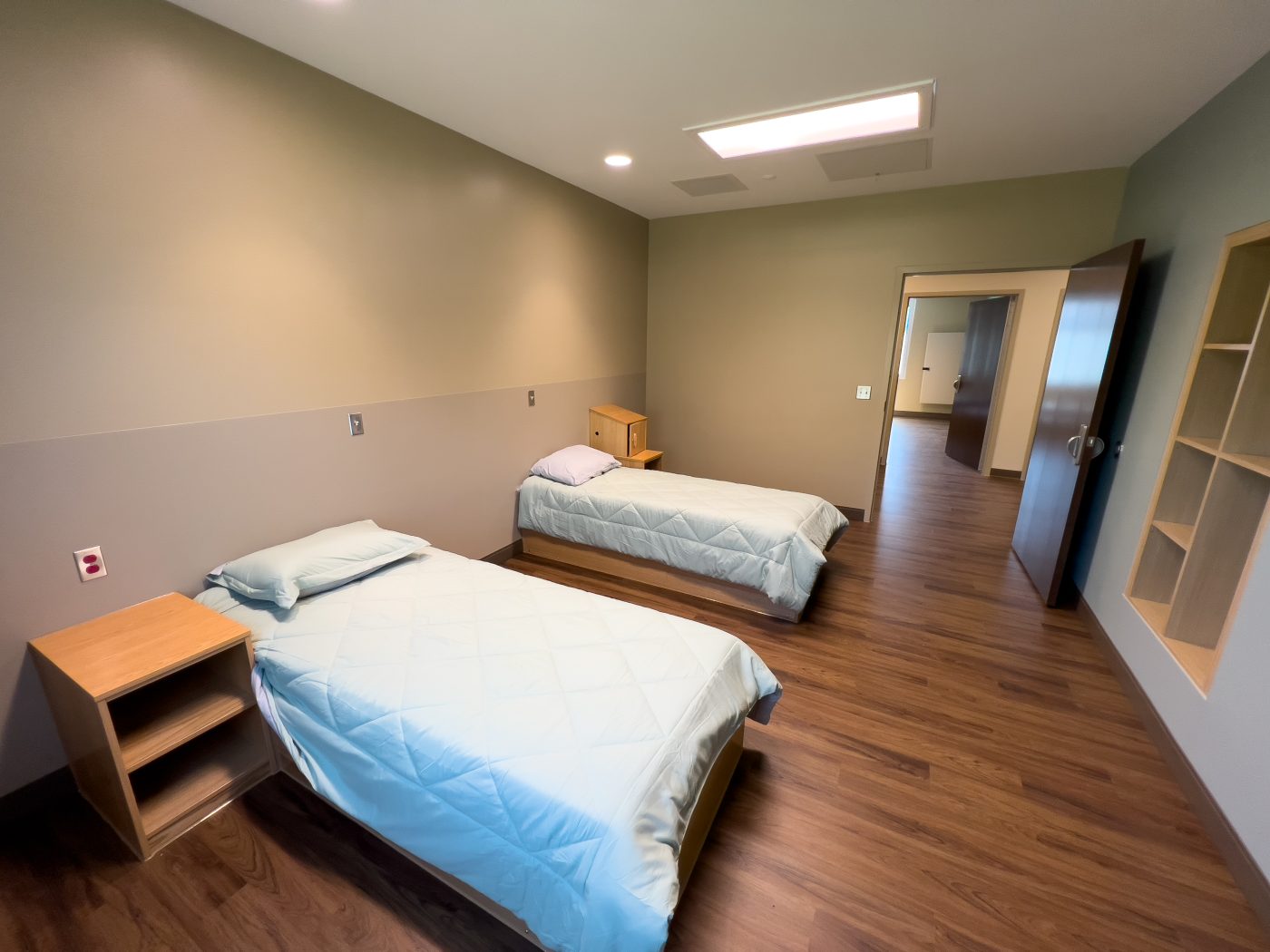Schizophrenia is a complex mental health disorder that affects a person’s perception of reality, thinking patterns, emotions, and behaviors. People who are struggling with schizophrenia may experience episodes of delusions and hallucinations. They may also experience symptoms that lead to social isolation and a lack of pleasure in things that were once enjoyable. These symptoms can make it hard to function and thrive. However, those who have schizophrenia can heal by receiving professional treatment.
At Bronson Behavioral Health Hospital, we offer clinically excellent mental healthcare for adults age 18 and older who are suffering from schizophrenia. Our inpatient schizophrenia treatment facility provides stabilization and support that can help people form a strong foundation for ongoing improvement and health.
Signs & Symptoms of Schizophrenia
Schizophrenia is a mental health disorder that is characterized by multiple symptoms, which vary from person to person. These symptoms can be organized into two categories: positive and negative.
Positive schizophrenia symptoms include the presence of new behaviors and thoughts, such as:
- Hallucinations: The most common type of hallucination symptom associated with schizophrenia is hearing voices, but hallucinations can also involve seeing, feeling, or smelling things others don’t.
- Delusions: Delusions are false beliefs that are not based in reality. These delusions may involve a sense of superiority or the idea that others are plotting against you.
- Disorganized thinking and speech: Difficulty expressing thoughts clearly can be a symptom of schizophrenia. Speech may be jumbled or nonsensical, making it hard for others to understand.
- Disorganized motor behavior: Atypical behaviors, such as repeating movements, excessive agitation, and posing in odd postures, can be signs of schizophrenia.
Negative symptoms of schizophrenia, on the other hand, involve the absence of typical behaviors and experiences. When someone is experiencing negative symptoms of schizophrenia, they appear to withdraw from the world around them. These symptoms can include:
- Flat affect: A reduced range of emotional expression or complete lack of response
- Social withdrawal: A tendency to avoid social interactions, leading to a loss of social relationships
- Loss of pleasure: An inability to experience pleasure or find enjoyment in previously pleasurable activities such as hobbies
- Speaking difficulties: A decrease in a person’s amount or quality of speech, leading to trouble with conversation
- Lowered motivation: Lack of motivation or inability to start and sustain activities, negatively impacting self-care, work, or academic performance
Depending on the person, symptoms can vary in severity and may come and go over time. If you or someone you know is experiencing these symptoms, it is crucial to reach out to a mental health professional for an accurate diagnosis and treatment. Early intervention and ongoing symptom management can significantly improve outcomes for people who have schizophrenia.
Potential Effects of Untreated Schizophrenia
Schizophrenia can negatively impact many parts of a person’s life, leading to feelings of distress. The following are common effects of untreated schizophrenia:
- Co-occurring conditions: Some people who have schizophrenia may also have a co-occurring mental health condition, such as depression or anxiety. Simultaneously addressing these co-occurring conditions can positively impact overall treatment outcomes.
- Strained family relationships: Schizophrenia can place strain on a person’s relationships with their family members and caregivers, who may have difficulty understanding what their loved one is going through.
- Decreased functioning: Untreated schizophrenia can negatively affect someone’s social relationships, education, employment, and independent living. Many people who have schizophrenia face challenges maintaining consistent jobs and may require help with daily living activities.
- Risk for death by suicide: People who suffer from schizophrenia have a higher risk for death by suicide compared with the general population.
With treatment, people who have schizophrenia can manage their symptoms and lead satisfying lives. Early intervention can be especially effective, but people who receive professional care at any point can heal. It is also important that those who have co-occurring mental health concerns receive treatment that addresses both concerns.
Schizophrenia Statistics
According to the National Alliance on Mental Illness (NAMI), the prevalence of schizophrenia in the United States is challenging to measure. However, researchers estimate that .25%-.64% of Americans suffer from it. NAMI also reports the following schizophrenia statistics:
- Even though people may develop schizophrenia at any age, the average age of onset is in the late teens to early 20s for men and the late 20s to early 30s for women.
- It is most common for people who have schizophrenia to be diagnosed between the ages of 12 and 40.
- It is possible for people to live well with schizophrenia if they receive treatment.
People who suffer from schizophrenia often have a co-occurring concern, such as a substance use disorder, posttraumatic stress disorder (PTSD), obsessive-compulsive disorder (OCD), or major depressive disorder. However, effective treatment for schizophrenia can improve these co-occurring or underlying conditions.
Benefits of Inpatient Schizophrenia Treatment
Inpatient treatment for schizophrenia involves intensive care in a hospital or specialized facility. While the specific benefits can vary, general advantages of inpatient schizophrenia treatment include the following:
- Stabilization: For patients who are experiencing disruptive schizophrenia symptoms, an inpatient treatment center can offer stabilization, leading to more clarity on treatment goals and ongoing improvement.
- Symptom management: Therapy and medication can help people manage the symptoms of schizophrenia. Medications can help reduce hallucinations, delusions, and disordered thinking, while therapy can help patients address their thought patterns.
- Improved coping strategies: During therapy sessions, patients can work with behavioral health staff and peers to understand symptoms and develop coping strategies that can support the healing process. During group and individual therapy, behavioral health professionals use evidence-based treatments such as cognitive behavioral therapy (CBT), which can help you identify and change negative thought processes.
- Higher quality of life: Effective treatment can lead to significant improvements for those who are struggling with schizophrenia. It can help reduce the impact of symptoms on daily functioning, relationships, and social interactions, allowing people to engage more fully in meaningful activities.
- Increased cognitive functioning: Inpatient care can address thinking difficulties associated with schizophrenia, such as problems with memory, attention, and decision-making.
- Improved social skills: Schizophrenia treatment can help patients navigate social and work challenges. Daily group therapy sessions encourage patients to develop social skills and form a network of peers.
- Family and caregiver encouragement: Our schizophrenia treatment plans often involve family members and caregivers. Education and therapy for loved ones can enhance their understanding and help them provide effective care.
- Improved long-term outcomes: By learning how to manage schizophrenia symptoms, people can achieve stability, maintain independence, and reduce the risk for complications.
Choosing to receive care at an inpatient treatment center allows you to focus on your healing process. If you have any questions about whether inpatient care is best for you, please contact us at Bronson Behavioral Health. Our excellent staff can answer any questions you may have about inpatient schizophrenia treatment.
Receiving Inpatient Schizophrenia Treatment at Bronson Behavioral Health
Receiving inpatient schizophrenia treatment at the right place can help you form a foundation for ongoing healing. At Bronson Behavioral Health Hospital, located in Battle Creek, Michigan, we can help you manage your symptoms, improve your functioning, and reach your long-term goals. Our treatment center provides the following services and features:
- Safety: Inpatient settings provide a safe and secure environment for people who are experiencing severe symptoms of schizophrenia. Trained professionals can be available to handle patient needs promptly, minimizing potential harm to the patient and others.
- Medication management: Inpatient treatment allows close monitoring of medication response and side effects. A psychiatrist can adjust a patient’s medication type and dosage as necessary. At Bronson Behavioral Health, if medication is part of your treatment plan, you can work with a psychiatrist and other mental health staff daily.
- Therapy and skill-building: Our inpatient schizophrenia facility provides individual therapy and family therapy as needed. We also offer daily group therapy that focuses on building coping skills, learning about diagnoses, and connecting with others who have had similar experiences.
- Structured routine: Bronson’s inpatient setting offers a highly structured daily routine, which can promote consistency, reduce stressors, and help patients establish healthy habits.
- Collaborative treatment team: The multidisciplinary team at our hospital includes healthcare professionals such as psychiatrists, psychologists, general practitioners, nurses, and social workers.
- Aftercare planning: At our inpatient treatment facility, we provide aftercare planning to ensure a smooth transition back to the community. This may involve coordinating outpatient follow-up appointments and connecting patients with community resources that can help them continue the progress they achieved during their inpatient stay.
The decision to receive inpatient schizophrenia care relates to the severity of your symptoms and your responses to previous treatment experiences. If you want to discuss whether inpatient care is best for you or your loved one, please contact the staff at Bronson Behavioral Health. Our team aims to help you learn to manage your symptoms and form a strong foundation for health and happiness.
This content was written on behalf of and reviewed by the clinical staff at Bronson Behavioral Health Hospital.






